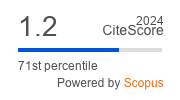Psycholinguistic Features of Pedagogical Communication in the Modern Ukrainian School
DOI:
https://doi.org/10.29038/eejpl.2018.5.2.zelKeywords:
psycholinguistic features, pedagogical communication, perception, conflict, pedagogical communication styles.Abstract
Pedagogical communication is commonly defined as sharing relevant information, necessary knowledge, and mutual coordination of teacher’s actions with their students. This interaction mediates the assimilation of knowledge, skills, abilities, the formation of personality and their competencies. It is argued that among the main psycholinguistic barriers of pedagogical communication are semantic, phonetic, rhetorical, and logical. Psycholinguistic features of the pedagogical communication encompass communicative, perceptive, and interactive components along with the main styles of this kind of communication: authoritarian, democratic, and liberal. Among the main findings of the study is the definition of the set of strategies such as avoiding verbal constructions that trigger and maintain communicative barriers, non-constructive effects of stereotypization, chronic conflicts, and other means aimed at strengthening authoritarian-oriented styles of communication.
References
- Баныкина С.В. Педагогическая конфликтология: состояние, проблемы исследования и перспективы развития. В кн.: Современная конфликтология в контексте культуры мира. М., 2001, 373–394.
- Бодалев А. А. Психология общения: Избранные психологические труды. 2-е изд. М.: Московский психолого-социальный институт, Воронеж: НПО «МОДЭК», 2002.
- Гурковська Т. Педагогічні стереотипи у взаємодії з дитиною. Вихователь-методист дошкільного закладу. 2012, № 3. C. 4–7.
- Дьяконов Г. В. Психология педагогического общения: теоретические и прикладные проблемы. Научное издание. Кировоград, 1992.
- Кан-Калик В. А., Ковалев Г. А. Педагогическое общение как предмет теоретического и прикладного исследования. Вопросы психологии. 1985, № 4. C. 9–16.
- Ложкін Г. В., Пов’якель Н. І. Психологія конфлікту: теорія і сучасна практика: Навчальний посібник. К.: ВД «Професіонал», 2006.
- Маркова А. К., Никонова А. Я. Психологические особенности индивидуального стиля деятельности учителя. Вопросы психологии. 1987, № 5, 40–48.
- Реан А. А., Коломинский Я. Л. Социальная педагогическая психология. СПб.: Изд-во «Питер», 2000.
- Рыбакова М. М. Конфликт и взаимодействие в педагогическом процессе. М.: Просвещение, 1991.
- Семиченко В. А. Психологія педагогічної діяльності: Навчальний посібник. К.: Вища школа, 2004.
References (translated and transliterated)
- Banykina, S.V. (2001). Pedahohicheskaia konfliktolohiia: sostoianiye, problemy issledovania i perspektivy razvitia [Pedagogical conflictology: state, research problems and development prospects]. In Sovremennaia konfliktolohia v kontekste kultury mira (pp. 373–394). Moscow.
- Bodalev, A. A. (2002). Psikholohiia obshcheniia: Izbrannyie psikholohicheskie trudy. (2nd ed.) [Psychology of communication: Selected psychological works]. Voronezh: Modek.
- Hurkovska, T. (2012). Pedahohichni stereotypy u vzaiemodii z dytynoiu [Pedagogical stereotypes in interaction with children]. Vykhovatel-Metodyst Doshkilnoho Zakladu, 3, 4-7.
- Diakonov, H. V. (1992). Psikholohiia pedahohicheskoho obshcheniia: Teoreticheskie i prikladnyie problemy. [Psychology of pedagogical communication: theoretical and applied problems]. Kirovohrad.
- Kan-Kalik, V. A., Kovalev, G. A. (1985). Pedahohicheskoe obshchenie kak predmet teoreticheskoho i prikladnoho issledovanyia [Pedagogical communication as an object of theoretical and applied research]. Voprosy Psykhologii, 4, 9-16.
- Lozhkin, H. V., Poviakel, N. I. (2006). Psykholohiia konfliktu: teoriia i suchasna praktyka: Navchalnyi posibnyk [Psychology of conflict: Theory and practice]. Kyiv: Professional.
- Markova, A. K., Nikonova, A. Ya. (1987). Psikholohicheskie osobennosti individualnoho stilia deiatelnosti uchitelia [Psychological Peculiarities of the Individual Style of Teacher Activity]. Voprosy Psikhologii, 5, 40–48.
- Rean, A. A., Kolominskiy, Ya. L. (2000). Sotsialnaia pedagogicheskaia psikhologiia [Social pedagogical psychology]. S.-Petersburg: Piter.
- Rybakova, M. M. (1991). Konflikt i vzaimodeistvie v pedahohicheskom protsesse [Conflict and interaction in the pedagogical process]. Moscow: Prosvescheniye.
- Semychenko, V. A. (2004). Psykholohiia pedahohichnoi diialnosti. [Psychology of pedagogical activity]. Kyiv: Vyscha Shkola.











 Creative Commons «Attribution» 4.0
Creative Commons «Attribution» 4.0